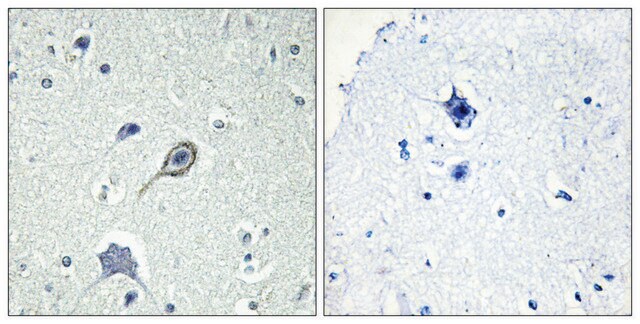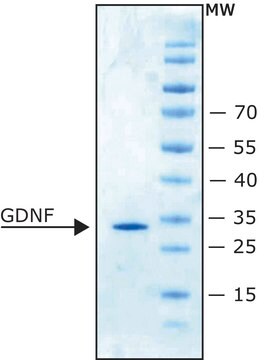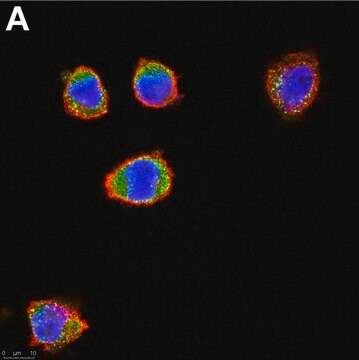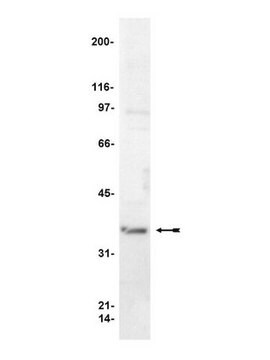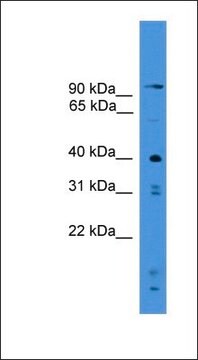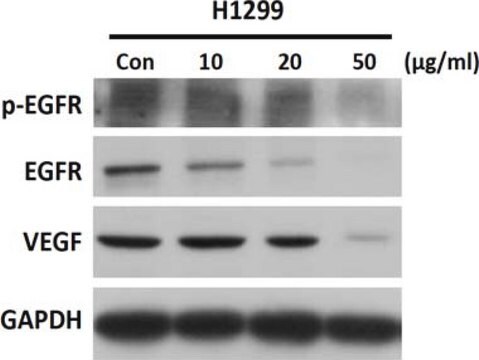推薦產品
生物源
rabbit
品質等級
共軛
unconjugated
抗體表格
affinity isolated antibody
抗體產品種類
primary antibodies
無性繁殖
polyclonal
形狀
buffered aqueous glycerol solution
分子量
antigen ~52 kDa
物種活性
rat, human
濃度
1 mg/mL
技術
immunocytochemistry: suitable
western blot: suitable
UniProt登錄號
運輸包裝
wet ice
儲存溫度
−20°C
基因資訊
human ... CNR1(1268)
rat ... Cnr1(25248)
尋找類似的產品? 前往 產品比較指南
免疫原
fusion protein containing amino acids 1-99 of the human CB1 receptor.
應用
Anti-Cannabinoid Receptor 1 antibody produced in rabbit is suitable for western blotting at a working dilution of 1:250 and for immunocytochemistry at a working dilution of 1:1000.
生化/生理作用
Cannabinoids exert their well-known physiological effects through two G-protein coupled receptors, CB1 and CB2. The cannabinoid receptor type 1 (CB1) is widely distributed in mammalian tissues, with the highest concentrations found in brain neurons while CB2 receptor function primarily in the peripheral immune system, found in spleen and may be present in the central nervous system, including the retina. The cannabinoid receptor type 1 are involved in modulation of adenylate cyclase and ion channels. It is also involved in the modulation of nociception, movement, learning and memory, emotion and many other neuronal processes. It also plays an essential role in drug addiction. CB1 receptor blockade may be useful for treatment of angiotensin II-dependent hypertension and associated metabolic syndrome.
外觀
Solution in phosphate buffered saline containing 1 mg/ml bovine serum albumin, 50% glycerol, and 0.05% sodium azide.
免責聲明
Unless otherwise stated in our catalog or other company documentation accompanying the product(s), our products are intended for research use only and are not to be used for any other purpose, which includes but is not limited to, unauthorized commercial uses, in vitro diagnostic uses, ex vivo or in vivo therapeutic uses or any type of consumption or application to humans or animals.
未找到適合的產品?
試用我們的產品選擇工具.
儲存類別代碼
10 - Combustible liquids
水污染物質分類(WGK)
WGK 3
閃點(°F)
Not applicable
閃點(°C)
Not applicable
分析證明 (COA)
輸入產品批次/批號來搜索 分析證明 (COA)。在產品’s標籤上找到批次和批號,寫有 ‘Lot’或‘Batch’.。
Natasha L Grimsey et al.
Journal of neuroscience methods, 171(1), 78-86 (2008-04-15)
The study of endogenous cannabinoid CB1 receptor proteins in neuronal tissues and cells relies on the availability of highly specific antibodies. We have tested the ability of a series of CB1 antibodies to detect endogenous receptors in brain as well
Laura Orio et al.
The Journal of neuroscience : the official journal of the Society for Neuroscience, 29(15), 4846-4857 (2009-04-17)
Extended access to cocaine produces an increase in cocaine self-administration in rats that mimics aspects of compulsive drug intake in human addicts. Although emerging evidence implicates the endogenous cannabinoid system in aspects of opioid and ethanol addiction, a role of
R G Pertwee
Current medicinal chemistry, 6(8), 635-664 (1999-09-02)
Mammalian tissues contain at least two types of cannabinoid receptor, CB1 and CB2, both coupled to G proteins. CB1 receptors are expressed mainly by neurones of the central and peripheral nervous system whereas CB2 receptors occur in certain non-neuronal tissues
Hajar Miranzadeh Mahabadi et al.
Molecular brain, 14(1), 89-89 (2021-06-09)
The type 1 and type 2 cannabinoid receptors (CB1 and CB2 receptors) are class A G protein-coupled receptors (GPCRs) that are activated by endogenous lipids called endocannabinoids to modulate neuronal excitability and synaptic transmission in neurons throughout the central nervous
C C Felder et al.
Annual review of pharmacology and toxicology, 38, 179-200 (1998-05-23)
Marijuana has been in use for over 4000 years as a therapeutic and as a recreational drug. Within the past decade, two cannabinoid receptor types have been identified, their signal transduction characterized, and an endogenous lipid agonist isolated from mammalian
我們的科學家團隊在所有研究領域都有豐富的經驗,包括生命科學、材料科學、化學合成、色譜、分析等.
聯絡技術服務

